中专英语综合教程第二册第十一单元精读教案
- 格式:doc
- 大小:41.50 KB
- 文档页数:5
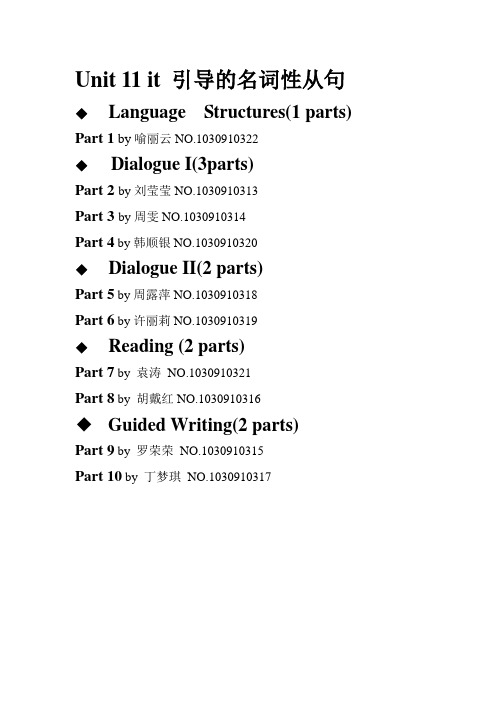
Unit 11 it 引导的名词性从句◆Language Structures(1 parts) Part 1by喻丽云NO.1030910322◆Dialogue I(3parts)Part 2 by刘莹莹NO.1030910313Part 3 by周雯NO.1030910314Part 4 by韩顺银NO.1030910320◆Dialogue II(2 parts)Part 5 by周露萍NO.1030910318Part 6 by许丽莉NO.1030910319◆Reading (2 parts)Part 7 by 袁涛NO.1030910321Part 8 by 胡戴红NO.1030910316◆Guided Writing(2 parts)Part 9 by 罗荣荣NO.1030910315Part 10 by 丁梦琪NO.1030910317I Language Structures It Patterns Part 1•It seems that•It happens that•It doesn’t matter + wh-word•It all depends on + wh-word pattern•sb find it adj thatIt seems that…It seems that...意思上表示的是“看上去,似乎”,后跟陈述语气的句子。
可以转换成名词或代词+seem +动词不定式的句型,其原意不变。
或则如果动词不定式为to be +形容词时,to be往往省略eg:It seemed that everything went wrong this morningeverything seemed to be wrongeverything seemed (to be)wrongeg:It seems that he is happy.=He seems to be happy.=He seems happy拓展知识:It seems to sb中it是个代词,代替前文所说的主语,后一般接句子。

《新时代高职英语(基础模块)2》电子教案【教师】让学生看图片与表达(详见教材),将图片与表达进行搭配【学生】看、思考、搭配【教师】检查练习的答案【学生】学习、理解、记忆【教师】让学生选择志愿者活动的优点,并检查答案【学生】思考、选择,检查【教师】解释新单词和短语1 community /kə'mjuːnəti/ n.社区;社会e.g. The entire community has been gripped by happiness.整个社区萦绕着幸福的氛围。
2 donate/dəʊ'neɪt/ v.捐赠e.g.All donated blood is tested for HIV and other infections.对所有捐献的血都要进行艾滋病病毒和其他传染病病毒检测。
3 charitable /'tʃærətəbl/ adj.慈善的e.g. His later years were devoted largely to charitable work.他晚年主要从事慈善工作。
4 foundation /faʊn'deɪʃn/ n.基金会e.g.The money will go to the San Francisco AIDS Foundation.这笔钱将交给旧金山艾滋病基金会。
5 disaster-stricken /dɪ'zɑːstə(r) 'strɪkən/ adj.受灾的e.g.Our country both provided help and support for the disaster-stricken people.我们国家始终站在灾区人民的身后,向他们伸出援手。
6 fulfillment /fʊl'fɪlmənt/ n.满足(感)A sense of ~ 满足感e.g.Accomplishing an objective set by ourselves can give us a sense of fulfillment.完成我们自己设定的目标可以给我们带来满足感。
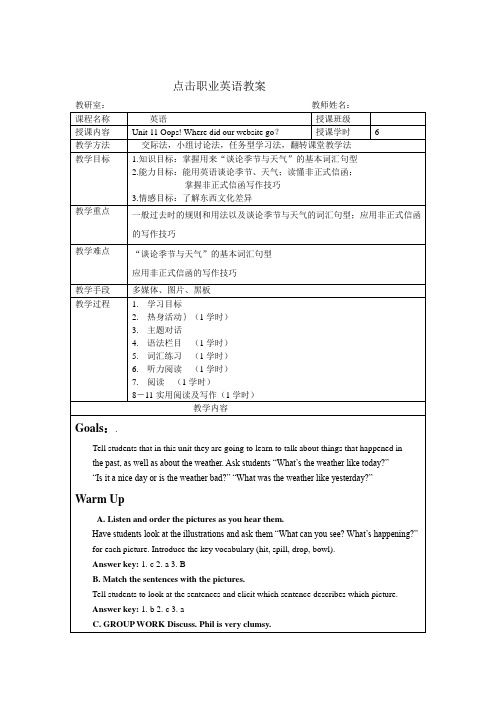
点击职业英语教案教研室:教师姓名:Are you sometimes clumsy? Do you have a clumsy friend?Present the word clumsy by miming dropping something and by having students look at the definition on the post-it.clumsy = not careful; often breaks thingsConversationAll that work!A.Look at the story and listen.Have students look at the photos and ask “Who can you see?” “Where are they?” “What are they doing?”Responses:Mike and Phil.They are in Mike’s new office.They are looking at Mike’s websites.Tell students they are going to read and listen to the conversation to find out what happened to Mike’s website.B. What are Phil and Mike looking at? What did Phil do? Is Mike’s website okay?Ask students the questions.Answer key: Mike’s new website.He pulled out a wire.Yes, because he saved it before Phil arrived.GrammarTalking about the pastCase y: Was Phil at Mike’s office?Annie: Yes, he was.Casey: Were you there, too?Annie: No, I wasn’t. I was at karate class.一般过去时构成be→was—( am,is 的过去式)were—( are 的过去式)V.→V-ed ( 动词过去式)用法表示过去发生的动作或状态,通常会有明确的表示过去的时间状语.I went to the zoo yesterday.I stayed up last night.一、动词的变化1.直接加ed:work—worked look—looked2.以不发音e结尾的单词,直接加d:live—lived hope—hoped use—used3.以辅音字母+y结尾的,变y为i加ed:study—studied carry—carried4.以重读闭音节结尾的,双写最后的辅音字母+ed:stop—stopped plan—planned 6.不规则变化的动词过去式:have—had are—were get—got say—said feel—felt do/does—did is—was go—went drink—drank eat—ate bring—brought think—thought buy—bought catch—caught teach—taught sit—sat wear—wore cut—cut sweep—swept sleep—slept become—becamePronunciationPast tense endings of regular verbs can be pronounced /t/, /d/, or /Id/. Listen to these past tense verbs.Vocabulary in ContextTalking about the seasons and weatherWrite the months of the year on the board from January through December and ask students which month it is at the moment. Have them listen and repeat the months of the year. Pointout that we always write the months with a capital letter. Reinforce understanding by asking students at random which month their birthday is in.Have students look at the photos and present the season and the weather for each. Explainthat fall is more common in the United States and autumn is used more in Great Britain.A. PAIR WORK What was the weather like last year? Take turns. Ask and answer questions about the weather.B. PAIR WORK Student A: look at the website map below. Student B: turn to page 176. Have students look at the weather map for March 5th. Establish that you are looking at a datein the past. Focus stu dents’ attention on the temperatures and review the numbers markedin Fahrenheit and Centigrade. Choose a couple of cities on the map and ask students“What was the weather like in...?”Elicit sentences such as, “It was warm.” “It was cold.” “It was 72 degrees Fahrenheit.” “It was 8 degrees Celsius.” and so on.Listening in ContextA.Listen. Write the names of the seasons.Tell students they are going to listen to four conversations and should pay attention to the season that is referred to in each conversation.D. Answer T (true) or F (false) to the following questions about the letter.1. Mary’s new address is 92 Tower Bridge Apartments.2. John and Mary painted the living room and bathroom.3. The living room is small.4. Mary has put up some pictures.5. Jane has invited Mary to visit for a weekend.6. Jane wants Mary’s Noodle recipe.。
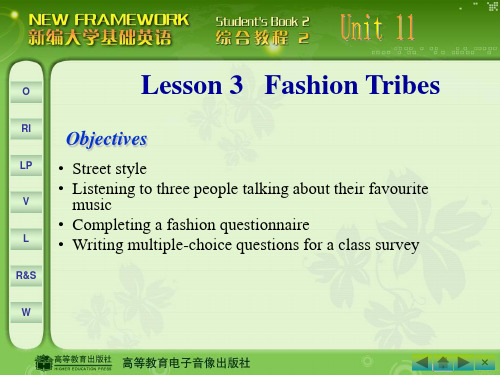
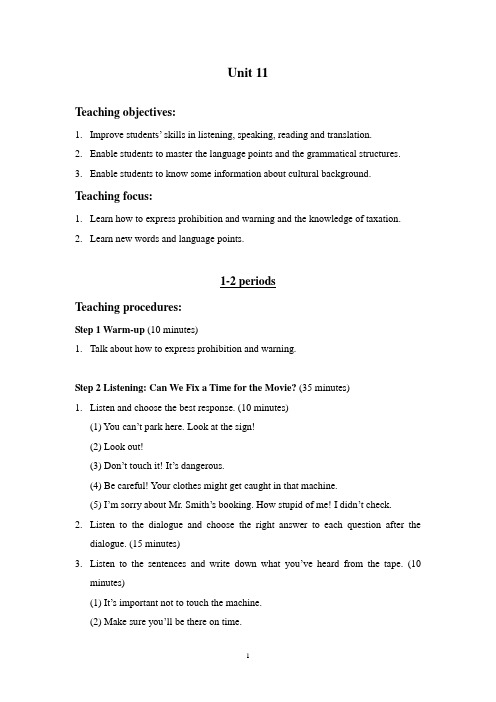
Unit 11Teaching objectives:1.Improve student s’ skills in listening, speaking, reading and translation.2.Enable students to master the language points and the grammatical structures.3.Enable students to know some information about cultural background. Teaching focus:1.Learn how to express prohibition and warning and the knowledge of taxation.2.Learn new words and language points.1-2 periodsTeaching procedures:Step 1 Warm-up (10 minutes)1.Talk about how to express prohibition and warning.Step 2 Listening: Can We Fix a Time for the Movie? (35 minutes)1.Listen and choose the best response. (10 minutes)(1) You can’t park here. Look at the sign!(2) Look out!(3) Don’t touch it! I t’s dangerous.(4) Be careful! Your clothes might get caught in that machine.(5) I’m sorry about Mr. Smith’s booking. How stupid of me! I didn’t check.2.Listen to the dialogue and choose the right answer to each question after thedialogue. (15 minutes)3.Listen to the sentences and write down what you’ve heard from the tape. (10minutes)(1) It’s important not to touch the machine.(2) Make sure you’ll be there on time.(3) You’re not allowed to smoke here.(4) Look out! Here comes a bus.(5)You shouldn’t watch so much television.Step 3 Speaking: Expressing Thanks (30 minutes)1.Read the model dialogue: Making an Appointment (5 minutes)2.Learn the sentence patterns and try to use them to express yourself. (5 minutes)(1) You can’t/may not/mustn’t smoke in the room.(2) No parking!(3) Smoking is prohibited.(4) Be careful!(5) They warned Mary not to go out alone at night.(6) Look out!3.Do some substitution drills. (10 minutes)4.Role Play: Suppose you are head of a workshop and one of your classmates avisitor. You are showing him/her around your workshop. What will you say? The following may help you.(10 minutes)Step 4 Preview the new words and expressions in reading (10 minutes)1.Read the new words and expressions.Taxation, govern, arrange, equally, direct, income, exist, percentage, taxpayer, indirect, import, duty, jewel, fur, fair, obtain, arrangementStep 5 Homework (5 minutes)1.Review the sentence patterns.2.Preview the text.3-4 periodsTeaching procedures:Step 1 Revision (5 minutes)1.Substitution drillsDrop it, make so much noise, waste money on smokingCan’t, mustn’t, are not allowed toSmoking, parking, spittingUse the room after 8:00 p.m., drink alcohol on the campus, park cars here Tome to be careful, her of the danger, that there would be snowstormStep 2 Warm-up (5 minutes)1.Is taxation necessary in a modern state? Why?2.What do you think of tax?Step 3 New words and expressions (35 minutes)1.Ask students to read the new words and expressions. (5 minutes)2.Read aloud after the teacher. (5 minutes)3.Explain in detail. (25 minutes)1. taxationThe new government has increased taxation.新政府已提高了税收。
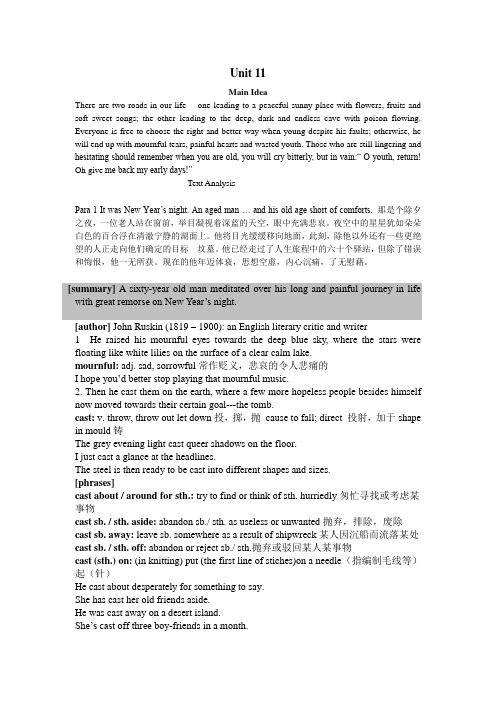
Unit 11Main IdeaThere are two roads in our life--- one leading to a peaceful sunny place with flowers, fruits and soft sweet songs; the other leading to the deep, dark and endless cave with poison flowing. Everyone is free to choose the right and better way when young despite his faults; otherwise, he will end up with mournful tears, painful hearts and wasted youth. Those who are still lingering and hesitating should remember when you are old, you will cry bitterly, but in vain:“ O youth, return! Oh give me back my early days!”Text AnalysisPara 1 It was New Year’s night. An aged man … and his old age short of comforts. 那是个除夕之夜,一位老人站在窗前,举目凝视着深蓝的天空,眼中充满悲哀。
夜空中的星星犹如朵朵白色的百合浮在清澈宁静的湖面上。
他将目光缓缓移向地面,此刻,除他以外还有一些更绝望的人正走向他们确定的目标---坟墓。
他已经走过了人生旅程中的六十个驿站,但除了错误和悔恨,他一无所获。
现在的他年迈体衰,思想空虚,内心沉痛,了无慰藉。
[summary] A sixty-year old man meditated over his long and painful journey in life with great remorse on New Year’s night.[author] John Ruskin (1819 – 1900): an English literary critic and writer1 He raised his mournful eyes towards the deep blue sky, where the stars were floating like white lilies on the surface of a clear calm lake.mournful: adj. sad, sorrowful常作贬义,悲哀的令人悲痛的I hope you’d better stop playing that mournful music.2. Then he cast them on the earth, where a few more hopeless people besides himself now moved towards their certain goal---the tomb.cast: v. throw, throw out let down投,掷,抛cause to fall; direct 投射,加于shape in mould铸The grey evening light cast queer shadows on the floor.I just cast a glance at the headlines.The steel is then ready to be cast into different shapes and sizes.[phrases]cast about / around for sth.: try to find or think of sth. hurriedly匆忙寻找或考虑某事物cast sb. / sth. aside: abandon sb./ sth. as useless or unwanted抛弃,排除,废除cast sb. away: leave sb. somewhere as a result of shipwreck某人因沉船而流落某处cast sb. / sth. off: abandon or reject sb./ sth.抛弃或驳回某人某事物cast (sth.) on: (in knitting) put (the first line of stiches)on a needle(指编制毛线等)起(针)He cast about desperately for something to say.She has cast her old friends aside.He was cast away on a desert island.She’s cast off three boy-friends in a month.2 He had already passed sixty of the stages leading to it, and he had brought from his journey nothing but errors and remorse.but: conj. however; otherwise than; without the result that但,而不,除非prep. except除了adv. only仅仅I’m sorry, but I won’t be able to come tonight.Nobody knows it but me.It’s anything but bad.[idioms]but for: if it is not because of要不是anything but: not at all毫不remorse: n. deep regret for wrong committed懊悔,自责mercy or pity同情心He was filled with remorse for having refused to visit his dying father.The captives were shot with remorse.3 Now his health was poor, his mind vacant, his heart sorrowful and his old age short of comforts.vacant: adj. not filled or occupied; mentally inactive空白的,未被占用的,空缺的Gazing into the sky, we couldn’t help admiring the immensity of Nature.short of: in want of ; lacking 缺乏,需要In the busiest season of the year, we are short of hands for the potato field.Para 2 [summary] In his youth, the author’s father gave him two roads to choose. One road represents the meaningful life, which would lead to success and happiness. And the other road represents a wasted life which would lead to a dark cave, alive with devils and deadly snakes.1.…and resounding with soft sweet songs…resound: v. (of place) ring or echo; produce echoes 回荡,回响The rocket resound as it blasted off the launching pad.2 …where devils and poisonous snakes hissed and crawled.poison: n. substance causing death or harm if absorbed by a living thing (animal or plant)有毒的物质It was reported in the paper that yesterday an old man committed suicide by taking poison.poisonous: adj. causing death or illness if taken into the body有毒的Don’t touch this kind of poisonous plant.hiss: v. n. make the sound heard when water falls on a hot surface 嘶嘶声The snake raised its head and hissed.The steam escaped with a hissing sound.Para 31O my father, place me once more at the entrance to life, and I’ll choose the better way![grammatical point] n. + toMany nouns should generally take the preposition “to ” after a noun. Typica l nouns requiring a “to” preposition include:journey, plane, entry, exit, access, promotion, hostility, devotion, kindness, obligation, damage, barrier, addition, preface, donation, assistant, letter, memorial, response, alternative, shock, disgrace, sensitivity, link, assent, adherence.He found a solution to the problem.His quick adaptation to the new environment is admirable.His appeal to a higher court has been rejected.Her parents would not give their consent to her marriage.Do not make reference to his lameness.2But both his father and the days of his youth had passed away. [paraphrase] But his father had died and his days of youth were gone.pass away: (of time) pass, die (euphemism) (指时间)流逝,去世[notice] Here, though the two parts of the subjects “father” and “days” share the verb phrase “pass away”, they mean differently with the first meaning “pass”, and the second “die”. This kind of usage is termed as Eugma(轭式搭配).Some examples are:At noon Mrs. Turpin would get out of bed and humor, put on kimono, airs, and the water to boil for coffee. (O. Henry)Mr. Pickwick took his hat and his leave. (Charles Dickens)She opened the door and heart to the homeless boy.He left in a huff and a taxi.Ten minutes later, the morning paper and the Manager arrived simultaneously.Para 41. He saw the lights flowing away.[paraphrase] He saw the lights disappearing.Notice the difference between see somebody do something and see somebody doing something. The former emphasizes the event itself, while the latter emphasizes the action.2.Then he remembered his friends in his childhood, who entered on life with him. … who entered on life …: enter into life, enter into is less formal than enter on / upon although they have almost the same meaning. Enter can be used both as a transitive verb or an intransitive verb: People enter (or enter) a house. He had not yet entered the deep, dark cave.enter on/upon sth.: make a start on sth.开始某事(law) take possession of sth.(法律)获得某物enter (sb.) for sth.: give the name of (oneself or sb. else) for a competition报名参加竞赛等enter into sth.: begin to deal with sth.开始处理某事物be able to understand or appreciate sth.领略,体会,能懂得并欣赏某事物The president has just entered upon another term of office.He entered on his inheritance when he was 21.The teacher entered him for the examination.Let’s not enter into details at this stage.During summer holidays, I entered into music.3. But they had made their way t o success…make one’s way: go (to), approach走向,接近,成功She hastily left the room, and made her way to bed.Para 51The clock in the high church tower stuck and the sound made him remember his parents’ early love for him.strike: v. 1) deliver blow or inflict blow on击打2) ignite (match) or produce (sparks etc.) by rubbing刮(火柴等)3) produce (musical note)奏乐4) (of clock) indicate time by sounding of bell(指时间)敲响报时5) attack suddenly, (of disease) afflict突然袭击, (疾病)侵袭The clock struck noon.Brutus stuck a dagger into the dying Caesar.Our troops struck the enemy camp at dawn.The ship struck an iceberg, which tore a huge hole in her bow.His enthusiasm struck his teacher favorably.[phrases]strike on sth.: get or find sth. suddenly or unexpectedly突然或意外地获得或发现某事物strike out (at sb./sth.): aim vigorous blows or attacks 猛烈攻击strike sth. out/through: cross sth. out删去某物strike up sth.(with sb.): begin ( an acquaintance, a conversation, a friendship) esp. casually(与某人)开始(认识,交谈,交往)strike off sth.:remove sb./sb.’s name from sth., esp. from membership of a professional body将某人/某人的名字从……中除去(尤指从专业团体中除名)He stroke a brilliant new idea at the decisive moment.He lost his temper and struck out wildly.The editor struck out the whole paragraph.He would often strike up conversations with complete strangers.2. They had taught him and prayed to God for his good.for one’s good:to one’s advantage 为……的利益for good: forever永远地be no good: be useless无用的,没有好处的I just told you for your own good.She says that she will leave the country for good.He advice was no good to me.3. His darkened eyes were full of tears, and with a despairing effort, he burst out a cry…despairing: adj. showing despair绝望的Her despairing look made the present people gloomier.burst out: 1) speak suddenly and with feeling突然激动地说,叫嚷2) (with the –ing form)suddenly begin (doing sth.)(与-ing连用)突然开始(做某事)burst into sth.: send out or produce sth. suddenly and violently突然而猛烈地发出或产生出某事物burst on/upon sb./sth.: come suddenly and unexpectedly to sb./sth.突然而意外地出现在某人/某物面前“ I hate you!” she burst out.After a moment of silence, he burst out laughing.The aircraft crashed and burst out into flames.The truth burst upon him.Para 6And his youth did return, for all this was only a dream which he had on New Year’s night. He was still young though his faults were real; he had not yet entered the deep, dark cave, and he was still free to walk on the road which leads to the peaceful and sunny land. 他的青春确实回来了,所有一切都在那个除夕之夜他的梦中发生,即使错误是真的,他还年轻,他没有走向那深黑的洞穴,他现在仍可以选择通往和平与阳光的大道。
语文版中职英语(基础模块下册)Unit11《CareerPlanning》word教案Unit11 Career PlanningPeriod I Vocabulary学习目标:复习掌握第7单元单词及短语。
学习过程:1.熟读本单元单词2.掌握重点单词和短语一、预习检测1. recommendation __________(v.)2. hunting ____________(v.)3. accounting ________________(v.) 4.concern ___________(p.p.)5. competition _______________(v.)6. challenge ___________(pl.)7. choose ___________________(n.) 8. decide ____________(n.)9. value ____________(adj.) 10.professional ____________(n.) 11. summarize ______________(n.) 12. education _____________(v.)13. recent ______________(adv.) 14. employer _____________(v.)15. special ______________(adv.) 16. seek _________ __________ 17. supply ________ ________ 18.interview _________ _________(n.) 二.词汇集锦1. prepare for ________________2. job interview ______________3. be concern about ___________4. decide to do ______________5. seek for ____________6. in person ________________7. begin with _______________ 8. agree to do________________ 9. 求职,找工作_____________ 10. 现在,目前_____________11.寻找______________ 12. 申请____________________13. 参加___________________ 14.充满____________________15.身份证_________________三.课内检测1. She has gone to New York for 3 months. Her family ____________(担心,关心) her.2. Here is a _____________(小结) of this lesson.3. Please fill in the ______________(申请表)。
《中专英语综合教程》第二册第十一单元精读教案
罗梅颜
教学目的和要求(Aims and Demands):
1.通过教学本文Thanksgiving Day 介绍感恩节这一北美传统节日的
历史及有关习俗,并利用多媒体播放Family Album U. S. A. 中有关感恩节的章节,以增加学生对西方文化习俗的了解。
2.要求学生能用自己的语言简述感恩节的由来.
教学重点(Main Points):
掌握强调句型,能较好地完成老师指定的练习。
教学难点(Difficult Points):
弄清几个长句的句子结构。
教学时间(Teaching Period):2课时
教学用具(Teaching Aids):录音机,多媒体
教学步骤(Teaching Steps):
Step 1.Revision of Words (10 minutes)
1.Play the tape and get the students to repeat the words after the tape
with books open.
2.Get the students to close their books and have a dictation. (Ask one or
two students to come out and write on the blackboard.)
3.Check their work with the whole class. (The others exchange their
books with the neighbor and grade it.)
Step 2. Presentation (55 minutes)
A.Give a brief introduction about Thanksgiving Day.
B.Play the tape of the text for the students to listen with books open
and try to get the main idea of the whole text.
C.Explain the language items in the text in details.
Paragraph One
a) No other holiday (that is today widely celebrated in North
America) has such a long and curios history as Thanksgiving.
先行词前如果有all,any ,no ,very,only,every等词或序数词或形容词最高级所修饰时,其后的定语从句只能用that引导。
e.g. She is the only person that can take care of me.
This is the best film that I’ve ever seen.
Paragraph Two
a)settle down“安家,定居”
e.g. He has always dreamed to settle down in a western country.
b)By spring, each family had a home, and all were planting
grains (they had brought with them from England) and corn (which was)(given them by friendly Indians). They were eating fish (that)(the Indians had taught them how to net), along with wild game from the woods.
along with: together with “和…一起,随着…”
c)To thank God for the good harvest, December 13, 1621 was set
aside for celebration.
thank…for… “为…感谢…”
e.g. Thank you for your help.
set aside “搁起,”
e.g. Don’t try to set aside the problem, face it and settle it,
please.
d)But in 1623, Thanksgiving day was so devoted to thanking
God that some people say it was the real beginning of Thanksgiving.
be devoted to… “专注于,致力于”
e.g. Diana was devoted to helping the poor in her life time. e)After the harvest, another day was set apart to thank God.
set apart “留下另作他用”
e.g. After the harvest, farmers usually set apart the best grain
for seed.
Paragraph Three
a)It was Abraham Lincoln who decided that the last Thursday in
November (should) be Thanksgiving Day.
此句为一强调句,强调确定感恩节日期的是林肯,而非别人。
强调句型的结构通常为“It +be+被强调部分+that/who(被强调部分指人时用)+其它…”这样一个结构.
e.g. It was Mary who / that met your sister in the zoo yesterday.
It was they who / that have learned English for five years.
It is in this school that offers continuing education classes. Step Three Consolidation(15 minutes)
1.Get the students to listen to the whole text once again to see
whether they have a full understanding of the text.
2.Play the video Family Album U.S.A (Episode Six)for the
students to watch and get them to have a further understanding
of Thanksgiving Day.
Step Four Summary(orally)
1.Teacher summarize the history of Thanksgiving briefly.
2.Ask one or two students to give a summary in their own words.
Step Five Assignment(written)
Finish off Grammar Exercise at Page 107.。